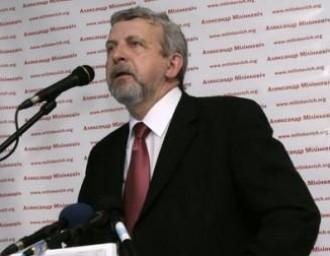Milinkevich: The Kremlin is successfully neutralising the Eastern Partnership

At the meeting with the EU leaders on March 14, the MFF’s chairman reported about quite successful attempts of Russia’s post-imperial revenge and called for a serious analysis of EU’s Eastern policy.
Aliaksandr Milinkevich, the chairman of the Movement for Freedom, talked about this at the closed summit of the European People’s Party in Brussels that was attended by the leaders of many European countries and EU structures. In particular, the summit was attended by the President of the European Council Herman Van Rompuy, President of the European Commission José Manuel Barroso, German Chancellor Angela Merkel, Poland’s Prime-Minister Donald Tusk, Sweden Prime-Minister John Fredrik Reinfeldt, Georgian President Mikheil Saakashvili, and others.
“The united Europe needs to perform a serious analysis of its Eastern policy, since negative defeatist trends are observed here. A new strategy should be developed and implemented to spread democracy and stability in the continent. The geopolitical situation is changing for the worse: antidemocratic and post-imperial revanchism grows stronger. The European Union needs a thorough strategy of particular actions, not rhetoric. Not words about feelings, but joint actions,” said Milinkevich at the EPP summit.
We have to acknowledge, said the MFF leader, that the Eastern Partnership’s implementation hasn’t advanced much: “The Kremlin is successfully neutralising this initiative, spending vast resources to engage its neighbours into its sphere of influence. Energy serves state policy in Russia, and state policy often serves energy in the European Union.”
Milinkevich thinks that similar processes are going on in every state of the Eastern Partnership: “There becomes not more Europe here, but less of it. Moscow has already begun to perform a creeping counter-revolution in Georgia and Moldova, who have previously stated their turning to the EU, and attempts to irreversibly tie up a satellite country Belarus. Russian money begins to privatise successfully the power in the post-Soviet area, and even to influence political processes in the countries who have become new EU members.”
The reason behind the defeats of the Eastern policy is “in diversity and inconsistency of the EU’s strategies, while Russia has only one clear strategy of countering the Europeanization and democratisation of former Soviet republics.” Milinkevich also thinks that “apprehensions concerning the revanchist policy of the Kremlin were often considered to be Russophobia or conspirology. Today, however, the situation shows that these were reasonable apprehensions concerning the inefficiency of the EU’s measures and concerning the underestimation of countermeasures taken by Moscow that is restoring the empire where communism will be replaced by oligarchs.”
Milinkevich declared that this autumn’s Eastern Partnership summit should work to preserve the prospects, first of all, of Georgia, Ukraine, and Moldova for association and European integration, despite the recent negative changes in these countries.
Belarusan problem is more complex: “Here, liberalisation and EU-optimism should be promoted among people and power elites, and “the taste of Europe” should be preserved.”
Patience should be an important element of EU’s consistent strategy in the Eastern direction, noted the MFF leader: “The change of the post-Soviet mentality requires the change of several generations, and the cycles of Euro-progress and regress could repeat. The EU, however, during bad times for the six countries of the Eastern Partnership, should not say: If you don’t want to be with us, good-bye then!”
Milinkevich pointed out that the restoration of the empire not only delays the establishment of democracy in our part of the Old Continent, and revamps its map, but, in fact, is harmful for Moscow itself: “This prospectless idea alienates Russia from the European civilisation even more, and leads to confronting it. At the same time, it is clear that dialogue with the Kremlin should be continued. Rapprochement between the EU and Moscow is necessary, but not at all costs. It should be carried out based on the transparent principles of pragmatic relations, and in compliance with the values of the united Europe.”
-
03.01
-
07.10
-
22.09
-
17.08
-
12.08
-
30.09








































